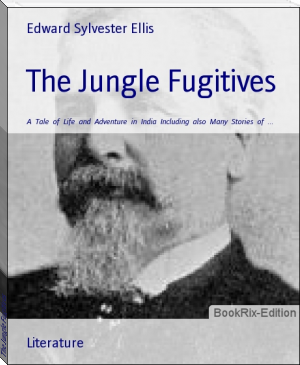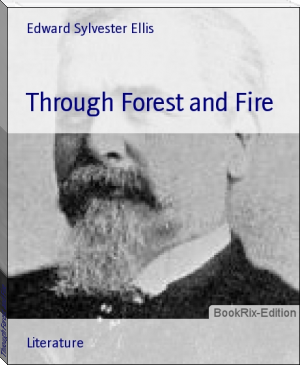The Jungle Fugitives - Edward Sylvester Ellis (black books to read txt) 📗

- Author: Edward Sylvester Ellis
Book online «The Jungle Fugitives - Edward Sylvester Ellis (black books to read txt) 📗». Author Edward Sylvester Ellis
CONTENTS
THE JUNGLE FUGITIVES
LOST IN THE WOODS
IN THE NICK OF TIME
LOST IN THE SOUTH SEA
AN UNPLEASANT COMPANION
A STIRRING INCIDENT
CYCLONES AND TORNADOES
LOST IN A BLIZZARD
THROWING THE RIATA
A WATERSPOUT
AN HEROIC WOMAN
THE WRITING FOUND IN A BOTTLE
THAT HORNET'S NEST
A YOUNG HERO
OVERREACHED
A BATTLE IN THE AIR
WHO SHALL EXPLAIN IT?
A FOOL OF A GENIUS
CHAPTER I.
IN THE SPRING OF 1857.
All through India, with its fanatical population five times as great as that of England, the rumblings of the coming uprising had been heard for months. The disaffection had been spreading and taking root. The emissaries of the arch-plotters had passed back and forth almost from end to end of the vast empire, with their messages of hatred and appeal. The people were assured that the "Inglese loge" were perfecting their insidious schemes for overthrowing their religion, and the faithful everywhere were called upon to crush the infidels in the dust. The evil seed fell upon the rankest of soil, and grew with a vigor and exuberance that threatened to strangle every other growth.
The plot, as agreed upon, was that a general uprising was to take place throughout India on the last day of May, 1857, but, as is often the case in such far-reaching schemes, the impatience of the mutineers precipitated the tremendous tragedy.
The first serious outbreak took place at Meerut on Sunday, May 10th, just three weeks previous to the time set for the general uprising. That town, with its population of about 40,000 at that time, lies thirty-two miles northeast from Delhi, which was to be the capital of the resurrected Mogul Empire. It was the precipitancy of this first revolt that prevented its fullest success. The intention was to kill every white man, woman and child in the place. Two regiments were clamorous for beginning the massacre, but the Eleventh Native Infantry held back so persistently that the others became enraged and fired a volley among them, killing a number. Thereupon the Eleventh announced themselves ready to take their part in the slaughter that was to free India from the execrated "Inglese loge."
Seeing now for the first time the real peril, the colonel of the Eleventh made an impassioned appeal to the regiment to stand by its colors and to take no part in the useless revolt. While he was speaking, a volley riddled his body, and he tumbled lifeless from his saddle. The Eleventh, however, covered the flight of the other officers, but helped to release a thousand prisoners, suffering punishment for various offenses, and then the hell fire burst forth.
The bungalows of the officers, the mess houses of the troops, and all the buildings between the native lines and Meerut were fired, and the whole became a roaring conflagration, whose glare at night was visible for miles.
When an appeal was made to the Emperor of Delhi by the troopers, he inquired their errand. The lacklustre eyes flashed with a light that had not been seen in them for years, the bowed form acquired new energy, and he gave orders to admit the troopers.
Their message was enough to fan into life the slumbering fires of ambition in the breast of a dying person.
He yielded to the dazzling dream. A throne of silver, laid away for years, was brought into the "hall of special audience," and the tottering form was helped to the seat, into which he sank and looked around upon his frenzied followers. Mohammed Suraj-oo-deen Shah Gezee was now the Great Mogul of India. A royal salute of twenty-one guns was fired by two troops of artillery from Meerut in front of the palace, and the wild multitudes again strained their throats. To the thunder of artillery, the strains of martial music and the shouting of the people, the gates of the palace were flung open, and Prince Mirza Mogul, with his brother, Prince Abu Beker, at the head of the royal bodyguard, rode forth, the king following in an open chariot, surrounded by his bodyguard.
With impressive slowness this strange procession made its way through the principal street, the populace becoming as frantic as so many ghost dancers. Finally a halt was made at the Juma Musjeed, the largest mosque in India, where the banner of the Prophet was unfurled and the Mogul Empire proclaimed.
CHAPTER II.
ON AN AFTERNOON.
Almost due east from Delhi Dr. Hugh Marlowe, a venerable American physician, had lived for more than twenty years. Since the death of his wife, six years previous to the Mutiny, he had dwelt alone with his only daughter, Mary, and their single servant, Mustad, a devout Mussulman. A portion of the time mentioned had been passed without the society of his beloved child, who spent several years in New England (where the physician himself was born and had received his education) at one of the fashionable schools.
Shortly after her graduation, Miss Marlowe met Jack Everson, fresh from Yale, and the acquaintance ripened into mutual love, though the filial affection of the young woman was too profound to permit her to form an engagement with the young man until the consent of her father was obtained, and he would not give that consent until he had met and conversed with the young gentleman face to face and taken his measure, as may be said.
"If he doesn't esteem you enough to make a little journey like the one from America to this country he isn't worth thinking about."
"But he _will_ make the journey," said the blushing daughter, patting the bronzed cheek of the parent whom she idolized as much as he idolized her.
"Don't be to sure of that, my young lady; romantic young girls like you have altogether too much faith in the other sex."
"But he _has_ started," she added with a sly smile.
"He has, eh? He will change his mind before he reaches here. How far has he got?"
"He was due in England many weeks ago."
"Well, well! How soon will he arrive _here_?"
"I think he is due now."
"Very probably, but his fancy will give out before he reaches this out-of-the-way place."
"I think not, papa."
"Of course not, of course not; I just told you that that is the way with all foolish girls like you."
The old gentleman had assumed a stern earnestness, and he added: "I tell you he will never show himself here! I know what I'm talking about."
"But he _is_ here, papa; let me introduce you to Jack Everson, a physician like yourself."
All this time the smiling young man was standing directly behind the old doctor, who was lazily reclining in a hammock on the shaded lawn, smoking a cheroot, while his daughter sat on a camp stool, with one hand resting on the edge of the hammock, so as to permit her gently to sway it back and forth. As she spoke the tall, muscular American walked forward and extended his hand.
"Doctor, I am glad to make your acquaintance," he said, in his cheery way. The astonished physician came to an upright position like the clicking of the blade of a jackknife, and meeting the salutation, exclaimed:
"Well, I'll be hanged! I never knew a girl so full of nonsense and tricks as Mary. You are welcome, doctor, to my house; let me have a look at you!"
Jack Everson laughingly stepped hack a couple of paces and posed for inspection. The elder deliberately drew his spectacle case from his pocket, adjusted the glasses and coolly scrutinized the young man from head to foot.
"You'll do," he quietly remarked, removing his glasses and returning them to the morocco case; "now, if you'll be good enough to seat yourself, we'll talk over matters until dinner time. When did you arrive?"
Jack seated himself on the remaining camp stool, a few paces from the happy young lady, accepted a cheroot from his host, and the conversation became general. Like most Americans, when at home or travelling, Jack Everson kept his eyes and ears open. He heard at Calcutta, his starting point, at Benares, Allahabad, Cawnpore and other places, the whisperings of the uprising that was soon to come, and his alarm increased as he penetrated the country.
"Worse than all," he said gravely, speaking of his trip, "one of my bearers spoke English well, and quite an intimacy sprang up between us. Since his companions could not utter a word in our language, we conversed freely without being understood. He was reticent at first concerning the impending danger and professed to know nothing of it, but this forenoon be gave me to understand, in words that could not be mistaken, that the whole country would soon be aflame with insurrection."
"Did he offer any advice?" asked Dr. Marlowe, less impressed with the news than was his visitor or his daughter.
"He did; he said that the escape of myself and of your family could be secured only by leaving this place at the earliest moment possible."
"But whither can we go? We are hundreds of miles from the seacoast and should have to journey for weeks through a country swarming with enemies."
"I asked him that question, and his answer was that we should make for Nepaul."
"That is the province to the east of us. It is a mountainous country, a long way off, and hard to reach. Why should he advise us to go thither?"
"I questioned him, but he seemed to fear that his companions would grow suspicious over our conversation and he said nothing more. I thought he would add something definite when we came to separate, and, to loosen his tongue, I gave him an extra fee, but he added never a word, and, unless I am mistaken, regretted what he had already said."
"It seems to me," observed the daughter, "that the man knew it is impossible for us to get to the seacoast, and believed that by going further into the interior we should reach the people who are not affected by the insurrection. Wide as it may be, there must be many points that will not feel it."
"That is the true reason," said her parent, "but, confound it! I have lived in this spot for twenty years; the little town of Akwar lies near, and there is hardly a person in it who has not been my patient. I am known even in Meerut and Delhi, and I can hardly believe the mutineers, for such they seem to be, will harm me or my friends."
"You once told me," replied Mary, "that when an appeal was made to the religion of this people they knew no such thing as fear or mercy."
"And I told you the truth," said her father gravely. "But since we have weapons and plenty of ammunition, and know how to handle





Comments (0)